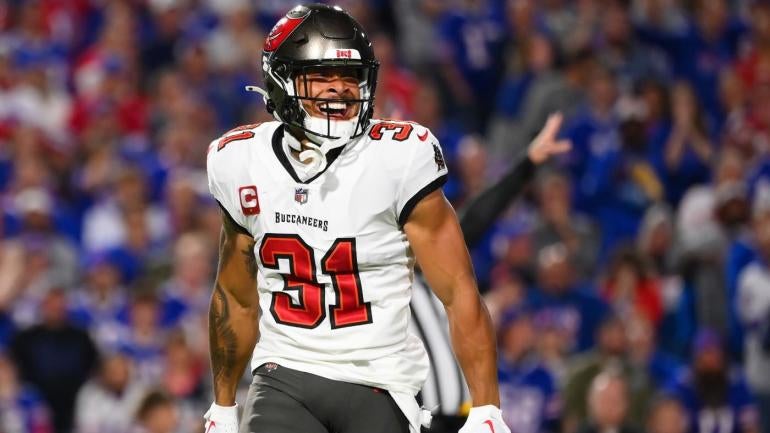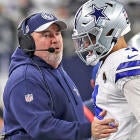
In the NFL salary hierarchy, cornerbacks traditionally rank ahead of safeties. That isn't the case anymore, at least temporarily with the top of these respective markets. A safety is the NFL's highest-paid defensive back for the first time during the salary cap era, which began in 1994.
The NFL's highest-paid defensive back is Tampa Bay Buccaneers safety Antoine Winfield Jr. The Buccaneers signed Winfield, who was designated as a franchise player for $17.123 million, to a four-year, $84.1 million contract averaging $21.025 million per year in May. Winfield replaced cornerback Jaire Alexander, who received a four-year, $84 million contract extension averaging $21 million per year from the Green Bay Packers in 2022, at the top of the defensive back salary totem pole.
Cornerback market stagnation and steady growth in the safety market are responsible for this unprecedented development. The top of the cornerback market has only increased by 5% since Jalen Ramsey became the NFL's first $20 million-per-year defensive back right before the 2020 regular season started. Ramsey signed a five-year, $100 million extension worth up to $105 million through salary escalators with the Los Angeles Rams.
The $15 million-per-year safety didn't exist at that time. Since the 2020 regular season ended, the top of the safety market has increased by 42.54%.
There is still a discrepancy in the guarantees with high-end cornerback and safeties contracts. Ramsey set records for cornerbacks with $43.703 million fully guaranteed at signing and $71.203 million in total guarantees. Denzel Ward was the first cornerback to eclipse both of Ramsey's marks in 2022. He signed a five-year, $100.5 million extension averaging $20.1 million per year containing $71.25 million in guarantees, of which $44.5 million was fully guaranteed at signing, with the Cleveland Browns. Winfield's $45 million in guarantees and fully guaranteed at signing are the most ever for a safety. Alexander and Ward both slightly moved the needle for cornerbacks two years ago. Ward's $20.1 million per year was a 0.5% increase over Ramsey's deal. Alexander bettered Ward by 4.48%.
The ball started getting dropped with cornerbacks last year. Trevon Diggs was thought to be a candidate to reset the cornerback market. He earned first-team All-Pro honors in 2021 when he led the NFL with 11 interceptions. Diggs was the first player in 40 years to pick off that many passes. His interception total dropped to three in 2022, but the number of big plays he gave up decreased as well. Improved consistency resulted in a second straight Pro Bowl berth in 2022.
The five-year, $97 million extension with $42.304 million of guarantees where $33.304 million was fully guaranteed at signing Diggs received from the Dallas Cowboys in 2023 was underwhelming. Diggs' $19.4 million per year put him on par with Marshon Lattimore's five-year extension from the New Orleans Saints in 2021 shortly before the regular season began. The difference is Lattimore got $68,346,588 in guarantees, of which $44,346,588 was fully guaranteed at signing.
The $19 million-per-year deal Jaylon Johnson signed with the Chicago Bears in March a couple of days before the 2024 league year began -- although he had been given a $19.802 million franchise tag -- was more puzzling. Twelve of the 38 players receiving franchise tags under the 2020 NFL Collective Bargaining Agreement before this year signed long-term deals. None of the 12 signed multi-year contracts averaging less than their respective franchise tag values like Johnson did.
Johnson was coming off a 2023 season where he put himself in the shutdown cornerback conversation. Opposing quarterbacks only completed 46.3% of passes (25 of 54 attempts) for a 31.0 passer rating when targeting Johnson, according to Pro Football Focus. He also had a career-high four interceptions.
Johnson didn't even crack the top five for cornerbacks with his four-year, $76 million contract. The $19 million per year is the same that Derwin James got from the Los Angeles Chargers in 2022 when he became the league's highest-paid safety on a four-year, $76 million extension.
The $19.802 million franchise tag, as well as stellar play in 2023, should have given Johnson enough ammunition to replace Alexander as the NFL's highest-paid cornerback. There is a school of thought that the average of two straight franchise tags can be used as a road map for a long-term deal. A second franchise tag for Johnson in 2025 at a CBA mandated 20% increase over his 2024 number would have been $23,762,400. The average of franchising Johnson twice in a row was going to be a little more than $21.75 million per year.
Johnson used the two franchise tags to set the value of the cash through the first two years of his deal. He would have made $43,564,400 going year-to-year by playing on two straight franchise tags. The difference between this amount and the $44 million of cash in the first two years (2024 and 2025) of Johnson's deal is negligible. Johnson had $43.8 million fully guaranteed at signing and $54.4 million in overall guarantees in his deal.
Locking in the approximate value of two franchise tags at signing wasn't enough of a trade off to give up additional two years in 2026 and 2027 for $32 million. Barring a major regression or an injury diminishing Johnson's skills, which are legitimate risks, he should have been able to command more than the $32.5 million needed in the first two years of a new deal in 2026 as a 27 year old to essentially break even with his $76 million over four years.
L'Jarius Sneed was the other cornerback to be designated as a franchise player this year. The Kansas City Chiefs placed a franchise tag on Sneed with the intent of trading him. Sneed clamped down on several opposing No. 1 wide receivers in 2023, including Davante Adams, A.J. Brown, Ja'Marr Chase and Justin Jefferson. Opposing quarterbacks completed 51.9% of passes (42 of 81 attempts) for a 55.9 passer rating, according to PFF, when targeting Sneed last season. Based on PFF data, Sneed didn't allow a touchdown in 600 regular season coverage snaps.
Sneed was either constrained by Johnson or the goal was to beat his deal since it was the latest data point in the cornerback marketplace. Sneed came in right above Johnson at $19.1 million per year when he was acquired by the Tennessee Titans at the end of March for a 2025 third-round pick. The teams also swapped 2024 seventh-round picks. Sneed's four-year, $76.4 million contract has $55 million in guarantees where $44 million was fully guaranteed at signing.
Six players were franchised this year in addition to Johnson and Sneed. Only Cincinnati Bengals wide receiver Tee Higgins hasn't signed long term. None of the other five have long-term deals averaging less than their respective franchise tags.
Patience could have been Johnson's best friend regardless of Sneed's contract. If Johnson hadn't been in such a rush to do a deal as a franchise player, he likely would have benefitted from Winfield's contract given the historical dynamic with cornerback and safety salaries.
The Bears would have had a hard time justifying to Johnson why he should take less than any safety in the league. As the July 15 deadline for franchise players to sign long-term deals approached, the Bears might have felt compelled to offer Johnson at least $84.2 million over four years, which would have put him ahead of Winfield at $21.05 million per year.
The market anomaly of a safety being the NFL's highest-paid defensive back should get corrected next year with Patrick Surtain II and/or Sauce Gardner. The Denver Broncos picked up a fully guaranteed $19.802 million fifth-year option for Surtain in 2025. Gardner, who was 2022's NFL Defensive Rookie of the Year, becomes eligible to sign a contract extension once the 2024 regular season ends on Jan. 5.



















